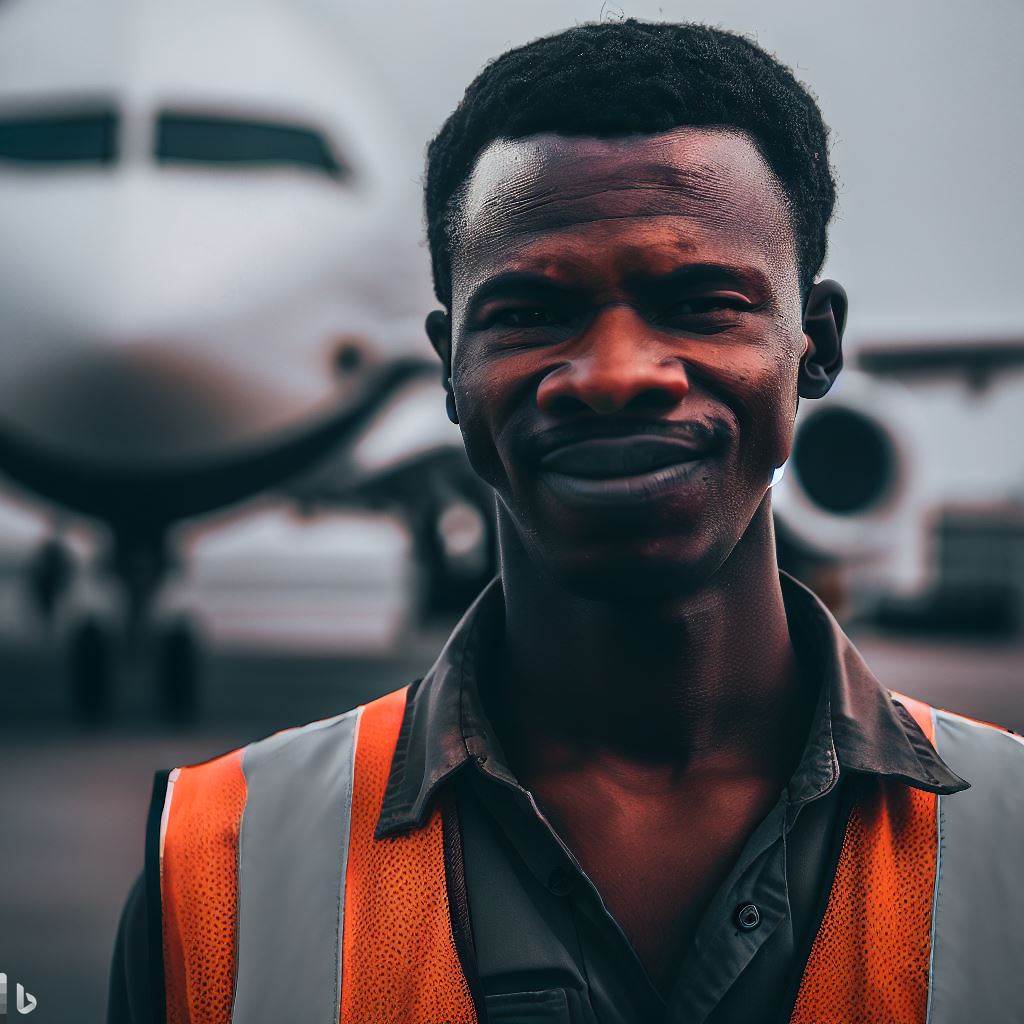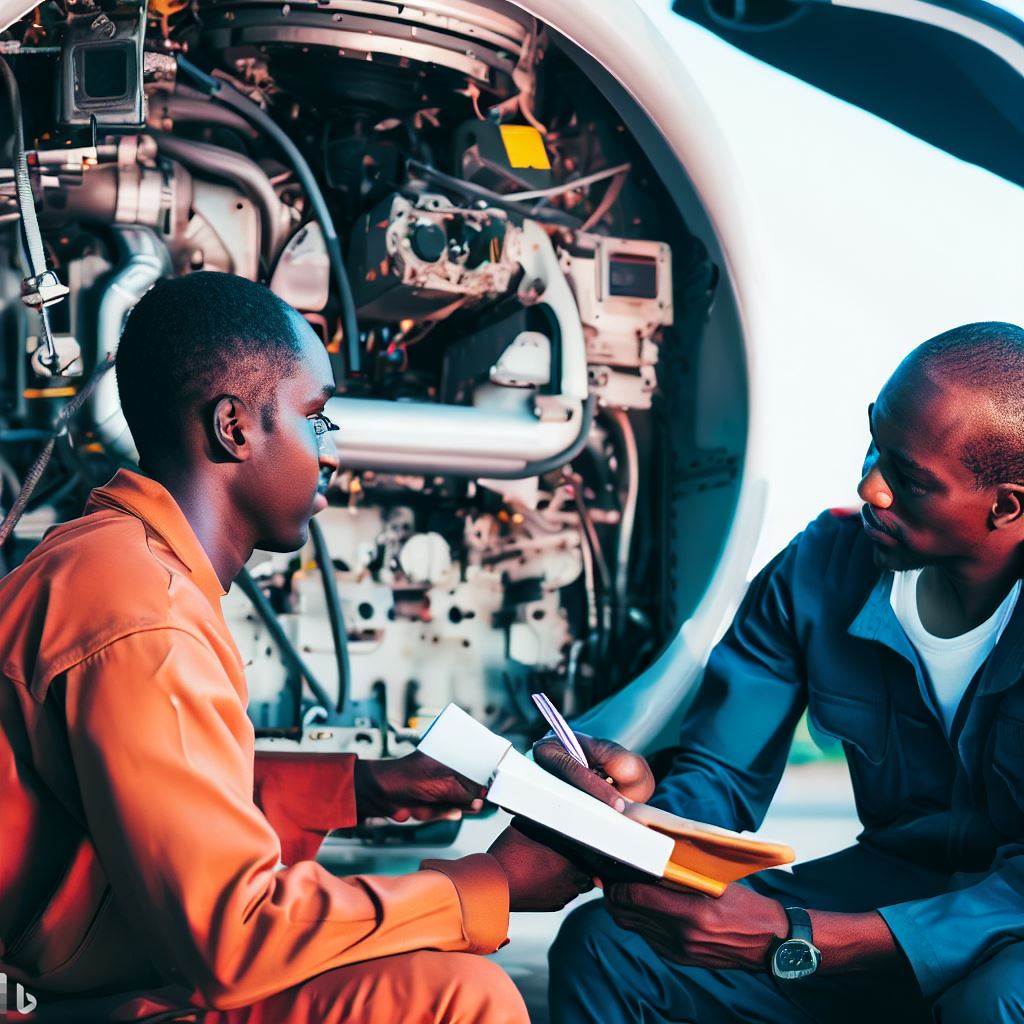Introduction
COVID-19 is a highly infectious respiratory disease caused by the novel coronavirus. The pandemic has caused widespread damage to several industries worldwide, including aviation.
In Nigeria, the aviation industry plays a significant role in the country’s economy, accounting for approximately $1.2 billion in GDP and employing more than 30,000 people directly and indirectly.
The thesis of this chapter is to examine the impact of COVID-19 on aviation jobs in Nigeria and how this has affected the overall industry.
Read: The Role of Technology in Nigeria’s Aviation Careers
COVID-19 and its Impact on Aviation Industry
The aviation industry has been one of the hardest hit industries by the COVID-19 pandemic.
Overview of the pandemic’s effect on aviation jobs
- Travel restrictions and lockdowns resulted in a significant drop in the demand for air travel.
- This decrease in travel demand caused airlines to cut back on flights, which resulted in layoffs and furloughs.
- As a result, many airline industry employees, from pilots to cabin crew members to ground staff, have lost their jobs due to the economic downturn brought on by the pandemic.
Analysis of the economic impact of COVID-19 on the aviation sector
The pandemic has led to significant financial losses for the aviation sector. Airlines have lost billions of dollars since the beginning of the pandemic, and many have been forced to seek government aid to stay afloat.
According to the International Air Transport Association (IATA), the global airline industry is set to lose more than $84 billion in 2020 alone, with a potential revenue reduction of 50% compared to 2019.
Statistics on the number of aviation jobs lost due to the pandemic in Nigeria
Nigeria’s aviation industry has also been hit hard by the pandemic, with airlines reporting significant losses and laying off workers.
According to the Nigerian Civil Aviation Authority (NCAA), the aviation industry in Nigeria lost approximately 124,000 jobs between April and September 2020.
This number includes jobs lost in airlines, ground handling companies, travel agencies, and other aviation-related businesses.
The Director-General of NCAA, Capt. Musa Nuhu, stated that the pandemic has caused significant disruptions to the aviation industry, resulting in a substantial impact on jobs in Nigeria.
In addition to layoffs, many airlines in Nigeria have also been forced to reduce salaries and hours for their employees due to the economic downturn caused by the pandemic.
The Nigerian government has also implemented travel restrictions and lockdowns as part of efforts to curb the spread of the virus, which has further contributed to the industry’s decline.
Essentially, the COVID-19 pandemic has had a severe impact on the aviation industry globally and in Nigeria. Many aviation employees have lost their jobs, and airlines and other aviation-related businesses have suffered significant financial losses.
Read: Aviation Training Schools in Nigeria: A Review
Impact on Employees
Aviation jobs in Nigeria have been severely affected by COVID-19 as the industry experienced a total shutdown for several months. This has led to the loss of jobs and job security for many employees in the industry.
Overview of types of aviation jobs affected
- Pilots
- Airline crew members
- Airport staff
- Aircraft maintenance technicians
- ATC personnel
All these categories of employees have been affected one way or the other due to the pandemic
Detailed analysis of how COVID-19 has affected job security of employees
The aviation industry in Nigeria has experienced massive job loss since the outbreak of the pandemic. Airlines have been forced to lay off staff due to low demand and government regulations.
Pilots, flight attendants, and ground staff were among the first to be affected as airlines stopped operations. Although some airlines have resumed operations, they have not been able to rehire all employees they had laid off.
Moreover, some airlines reduced salaries of employees who still have their jobs.
The industry is still struggling to recuperate from the impact of the pandemic, and some experts predict that full recovery may take years. Consequently, job security for employees is still far from certain.
Discussion of the financial implications for aviation workers
The pandemic has had a devastating impact on the finances of aviation workers.
Many employees have lost their jobs and have found it challenging to find new employment in the industry. The laid-off employees may have to wait for a long time before finding other opportunities.
Even for those that kept their jobs, there have been salary cuts across the board, making it hard for workers to cater to their expenses.
For instance, it has been reported that many pilots have taken up manual labor just to earn a living. Aircraft maintenance technicians have also been hit hard, as many airlines reduced the number of aircraft in their fleet, leading to a decreased demand for their services.
The impact of COVID-19 has compounded the harsh economic conditions that were already in existence in Nigeria. The loss of jobs and income for aviation workers has led to an increase in the unemployment rate and poverty level in the country.
The aviation industry in Nigeria continues to experience the adverse effects of the pandemic on its employees.
While some airlines have tried to rehire staff, it may still take a long time before things return to normal.
Therefore, the government, aviation stakeholders, and employees need to work together to ensure that workers are not left without support during this difficult time.
Read: Exploring the Life of an Air Traffic Controller in Nigeria
Compliance with Health and Safety Guidelines
As the world adjusts to the new realities brought about by the COVID-19 pandemic, adherence to health and safety guidelines has become an essential part of everyday life.
This is especially true for the aviation industry, where the risk of transmission of the virus is higher due to the nature of air travel.
In Nigeria, airlines and airports have had to implement new guidelines to protect both passengers and employees.
Explanation of the health and safety guidelines for airports and airlines
The Nigerian Civil Aviation Authority (NCAA) has issued guidelines regarding the operation of airports and airlines during the pandemic.
These guidelines include mandatory use of face masks, physical distancing measures, and temperature screenings for both passengers and employees.
Airlines are also expected to maintain a high standard of hygiene, with regular disinfection of all surfaces and air filtration systems.
Passengers are required to sanitize their hands regularly and follow all health protocols in place at the airport and on board the aircraft.
Discussion of the challenges associated with implementing these guidelines in Nigeria
Implementing these guidelines has been challenging for airlines and airports in Nigeria.
Many passengers and employees are skeptical about the effectiveness of these measures and see them as an inconvenience. There has also been a shortage of personal protective equipment (PPE) in Nigeria, making it difficult for airlines and airports to provide these essential resources to employees.
Additionally, with a lack of clear and consistent government support and guidance, airlines and airports have had to navigate the ever-changing landscape of COVID-19 safety protocols on their own.
Analysis of the impact of compliance with these guidelines on aviation jobs
The compliance of airlines and airports with these guidelines has had a significant impact on aviation jobs in Nigeria.
Many jobs have been lost due to decreased demand for air travel and reduced capacity of airlines. The strict adherence to health and safety guidelines has also led to increased operational costs for airlines and airports, further impacting employment opportunities in the industry.
However, compliance is essential in protecting the health of employees and passengers, and in restoring the trust of passengers in air travel.
In short, compliance with health and safety guidelines in the aviation industry is essential in protecting both passengers and employees during the COVID-19 pandemic.
While implementing these guidelines may pose challenges for airlines and airports in Nigeria, it is critical in the recovery and survival of the aviation industry and the restoration of employment opportunities for workers in the industry.

Government Intervention
A. Overview of the Roles Government Can Play in Alleviating the Impact of COVID-19 on Aviation Jobs
- Financial support for airlines
- Waiver of taxes and duties
- Extension of loan repayment deadlines
- Investment in airport infrastructure
- Regulatory relief to ease operational costs
A Review of the Measures the Nigerian Government Has Taken to Support the Aviation Industry During the Pandemic
- The Central Bank of Nigeria (CBN) established a N50 billion targeted credit facility for affected households and small businesses in aviation.
- The Federal Government granted a 50% waiver on duty payable for imported commercial aircraft, spares, and ground handling equipment.
- The government has given a three-month waiver on the payment of aeronautical and passenger service charges to airlines.
- The Federal Government granted N4 billion in bailout funds to local carriers.
- The Federal Airports Authority of Nigeria (FAAN) waived rent for airlines and other service providers at airports nationwide.
Comparison of Nigeria’s Government Intervention to Intervention in Other Countries
- France provided a 7 billion euro aid package to their airline, Air France.
- The US government passed a $50 billion bailout package for airlines and contractors, including payroll support for workers.
- Canada established a C$2.4 billion aid program to support airlines and airports.
It is clear that the Nigerian government has taken steps to support the aviation industry during the COVID-19 pandemic. However, these measures may not be enough to fully alleviate the impact of the pandemic on the aviation sector.
Compared to other countries, Nigeria’s government intervention seems less extensive, with smaller financial aid packages and fewer overall measures.
It remains to be seen how effective these forms of government intervention will be in stemming the tide of job losses and economic hardship in Nigeria’s aviation industry.
Read: Role of Women in Nigeria’s Aviation Industry
Future Implications
Analysis of the long-term impact of Covid-19 on the aviation industry in Nigeria
The COVID-19 pandemic has caused significant disruptions in the aviation industry in Nigeria, and it is undeniable that it will have long-term effects that will shape the industry’s future.
According to the International Air Transport Association (IATA), the Nigerian aviation industry may take at least three years to recover fully from the pandemic’s effects.
One of the long-term impacts of the pandemic is the shift in consumer behavior. Many travelers have resolved to cut back on non-essential travel due to fear of contracting the virus.
There is also a considerable reduction in corporate travel as businesses seek to adopt remote working models. This means that the demand for air travel will remain low, and airlines may have to adjust their operations accordingly.
Furthermore, the pandemic’s economic effects have resulted in many airlines struggling to stay profitable due to the massive revenue losses incurred during the lockdowns. This could lead to consolidation in the industry, with weaker airlines going bankrupt or being acquired by stronger rivals.
Possible steps the aviation industry can take to adjust to the “new normal”
To adjust to the “new normal” that the pandemic has imposed on the aviation industry, stakeholders must take proactive steps.
Firstly, airlines must prioritize maintaining passenger confidence in air travel by implementing health and safety measures such as regular deep cleaning of aircraft, mandatory use of masks, and social distancing.
Secondly, airlines must adopt flexible pricing and refund policies to incentivize travel. Suppose airlines can offer discounts and flexible ticket policies to meet travelers’ changing expectations.
In that case, they may increase their chances of keeping a steady stream of passengers and lead the road to recovery.
Finally, new business models that promote partnerships and collaborations can help airlines reduce overhead costs and stay afloat during tough times. For example, airlines could partner with hotels to provide bundled travel packages or share ground-handling services with other airlines.
Forecast for the future of aviation jobs in Nigeria
It is challenging to predict the future of aviation jobs in Nigeria due to the uncertainties posed by the COVID-19 pandemic. Still, it is apparent that the industry will experience significant changes in the coming years.
The reduction in demand for air travel may result in job losses in the short term, with airlines cutting down on staff to reduce costs.
However, the recovery of the aviation industry in Nigeria will create new opportunities in the long term with the potential for the creation of more jobs.
The pandemic has also given rise to innovation in the industry that may create new jobs, such as the use of drones for cargo delivery or autonomous cleaning robots.
Airlines that embrace new technologies will have a competitive edge and may become attractive employers to innovative-minded job seekers.
In essence, the COVID-19 pandemic has had a significant impact on aviation jobs in Nigeria.
However, stakeholders in the industry must take proactive steps to adopt new business models, prioritize passenger safety, and embrace new technologies to adjust to the “new normal” and set the industry on the path to recovery.
Read: Steps to Becoming a Pilot in Nigeria: A Comprehensive Guide
Discover More: Understanding Safety Standards in Nigeria’s Aviation
Conclusion
Recap of main points:
- COVID-19 has had a severe impact on aviation jobs in Nigeria.
- Air travel has decreased drastically, and the impact of COVID-19 on aviation jobs is causing airlines to cut jobs and salaries.
- Aviation workers, such as pilots and cabin crew, have been hit the hardest.
Final thoughts on the impact of COVID-19 on aviation jobs in Nigeria:
COVID-19 has exposed the vulnerability of the aviation industry to external shocks. The Nigerian government needs to act fast to support the industry and protect jobs. The industry will also need to find new ways to adapt to the new normal.
Call to action or suggestion for further research:
It is crucial to monitor the situation closely and identify ways to support the aviation industry and its workers.
Further research could explore the long-term impact of COVID-19 on the industry and the effectiveness of government interventions.




